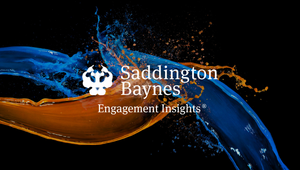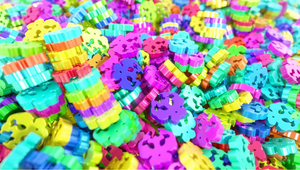
The New Face of Beauty Marketing: Experimenting with Non-Traditional Methods to Inspire Change

The beauty industry has faced mounting criticism for its approach to advertising, with luxe airbrushed imagery that present unattainable standards leading to consumers demanding more transparency. The industry has faced more and more scrutiny since the advent of the 24 news cycle, as brands are called out for damaging or deceiving practices.
Harnessing the power of neuroscience, Saddington Baynes focuses on identifying the effectiveness of advertising. Using their visual optimisation and consultation service, Engagement Insights®, the neuro-led production company tested consumer reactions to traditional beauty marketing from the UK and US, analysing the emotional and visual impact these campaigns have on modern consumers. In their whitepaper - Do Famous Faces Reduce the Effectiveness of Ads - the SB team explore these findings, reevaluating common tropes such as highly polished images that feature influential or celebrity endorsers. The findings highlight how modern consumers are now more emotionally attached to images that reflect themselves, considering celebrity standards to be out of reach as opposed to the reality of everyday people. This suggests the curtain has been lifted on curated celebrity endorsements as consumers wise up to the industry’s tactics.
Inspired by these findings, Saddington Baynes began to consider ways their creative and production expertise could be used to redefine beauty, forging the way for new forms of advertising. In favour of creative thinking, and informed by the findings of their research, Saddington Baynes produced a visual showcase using alternative, non-traditional creative methods which removes focus from the female body, and instead places CGI at the centre.
As the company continues to conduct their neuro-creative research in pursuit of the new face of beauty marketing, LBB’s April Summers speaks directly with the team members behind this pioneering work. Sitting down with commercial director Ellie Lucas, head of insights Callum Gould and CEO Chris Christodoulou, LBB finds out how this work marks an important step towards inspiring change within the beauty industry.
LBB> Having tested the impact of countless brand imagery, to gauge the emotional and visual impact, what have you found to be the most effective in beauty marketing?
Callum> What we have found is that content which engages specifically with emotions is the most effective. We know that sharing your product and making that the main focus - as opposed to talent or location etc. - is what people respond best to. It also helps stand out, improving brand distinction.
Something we have seen is that brands need to pay more attention to their audience and what they expect and desire from the brand. As we can test against specific audiences, it means we have the ability to refine content for them, even giving a brand options to have specific pieces of content for the different segments of their audience. These can be the exact same campaign just with variations that are more effective for different people.
LBB> What type of imagery do you predict we will be seeing more of in the future?
Chris> Consumers are becoming more and more discerning in their choices and where they place their brand loyalty and buying power. They expect a lot from their brands and want to be rewarded for their attention.
As such, the content needs to evolve further than it is today. I believe we will see imagery that is more engaging, interactive and educational, holding the attention longer and rewarding the consumer by giving them greater value for their time. The imagery will be designed to connect more emotionally with them to enhance brand perception and emotional impact.
LBB> Celebrities have been used in advertising for decades. What key cultural trends and events in recent years have contributed to the neurological change in consumer responses to famous faces in ads?
Callum> Recently we have seen that brand trust is more important than ever. As a result, brands want to see genuine interactions, as well as endorsements that feel real. Part of celebrating body positivity as well as consumers absorbing more content in the home means that a lot of their decisions are much more personal. As a result this means the emotional levers that may have driven positive responses in the past, may not be as effective now.
LBB> What did you hope to showcase through the Redefining Beauty project?
Ellie> A few years ago our team was keen to enter the beauty industry, but we believed in the power of creativity to change the conversation and aesthetic of the industry. We set about crafting a showcase that visually redefined beauty; using creativity to cast aside unrealistic beauty standards and damaging ideologies.
The campaign was all about portraying a different understanding of beauty. What if we made every person, in every culture feel inspired, validated and beautiful with our advertising? Our 'Redefining Beauty' showcase explores the power of CGI and FX - taking reference from iconic trailblazers including Alexander Mcqueen and Kevyn Aucoin - to look at abstraction, misconception and complementary contrasts. Using CG, we've freed ourselves from the constraints of photography, experimenting with the motion of physics, photo-realism and abstraction to see how we can inspire awe, authenticity and beauty.
From pencils snapping to release breathtaking powder explosions to seamless nail polish swipes - our creative team successfully directed and crafted an edgy, forward thinking and stunning film, that demonstrates the flexibility of CGI - while channelling a new style and concept for beauty brands.
LBB> In the whitepaper you touch on ‘mimetic desire’ - can you tell us a bit more about how this relates to advertising in the beauty industry?
Callum> Mimetic desire, in the context of advertising, is the theory that consumers respond better to content to which other people have also reacted positively, or shows a highly desirable lifestyle. In advertising imagery, it leads consumers to think, "I want to be just like that person," which is likely to result in increased intent to purchase said product or brand.
Beauty brands have done this very successfully in the past, with brand messaging such as, "Want to have lashes like celebrity X?” or “Look at how much of an amazing time celebrity Y is having at this high-class event because of our product". However, recently this has become less of a successful tactic, as people are evaluating their ideals around what the true face of beauty should be. Consumers want to see the 'average person' in content as opposed to traditional norms with potentially dated rules placed on them.
LBB> How does your neurological research prove more telling than simply asking consumers for feedback?
Callum> We ensure we are not asking consumers directly which means that we are able to reduce a lot of the biases that consumers may have. In doing so, they are not able to post-rationalise their decisions and validate why they feel a certain way about something.
A lot of times if you directly ask someone for their opinion, or how they feel, they are able to curate their response based on a variety of factors - what others have said, who they are talking to, what they feel they are expected to say, etc. Using neuro-creativity we are able to understand what they really think and intercept their nonconscious reactions. This means we get a truer reading as to how they feel about content which has been demonstrated to be a significantly more effective predictor of consumer behaviour than traditional research.













